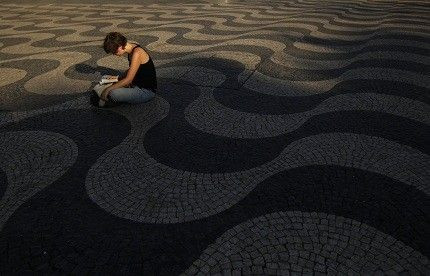Monday Books Blog Report: A Literary Betrayal, a Reading Diet, and More

Erin at Pleasantries and Pit Bulls says that for a while she and her fiancé have looked somewhat condescendingly on those who use Kindles and other such e-reading devices, telling themselves, We're book people.
She likes collecting books, having a full bookshelf, and the physical experience and familiar ritual of having a book in her hands.
But now -- gasp! -- she is on the verge of betraying her trusty friends, and everything I thought I stood for in the realm of ink printed pages bound with glue.
Forgive me father, for I have sinned. I desperately want a tablet reader, the twentysomething Brooklyn blogger writes.
She explains that the time has come because large paper books are no longer practical in her life, on her rides on the New York subway:
I guess the truth of the matter is, if I only read at home, in the comfort of my living room or in bed at night, I'd stick with books forever. But alas, I'm in NYC, and my 'reading time' usually involves a packed subway car of sweaty, smelly people, with elbows in my face and baby carriages running over my feet. If I'm lucky, I can find a way to get one of my hands near a pole to hold onto, otherwise I'm stuck in the middle of the train in no-man's land, trying to use all the core strength I have from yoga to keep from falling on the group of teenagers shouting at each other in front of me, or the guy with some sort of weird skin disease behind me. And this is on a good day.
At her blog, YA fantasy author Christine Rose questions New York publishers' e-book royalties and pricing. She says the publishers are working on a century-old business model, and it's starting to hurt them in a big way, especially because of e-books, which she says they are selling at prices that are way too high.
Consumers care about their budget. Why would they buy an eBook for $9.99 when they could buy three at $2.99? Rose asks. This is why more and more self-published authors are being found, if they price their eBooks right. Someone will take a chance on an unknown author, especially because they can sample the first chapter for free.
See Rose's post -- and in turn an earlier one by Kristine Kathryn Rusch -- for much more on the problems they have found with e-book royalty statements.
If we are what we eat, then are our brains what we read? At Unputdownables, Wallace makes five recommendations for a well-balanced reading diet. Among them: Reading for entertainment and for knowledge are equally important, and Reading (auto)biographies and memoirs can be therapeutic.
Here are some more quick hits from elsewhere in the books blogosphere today:
? Blackwatertown ponders unfinished books -- those you will never complete because of the writing or form, or those stories whose ends will never be reached (such as when the author dies).
? The Department of Illustration has a fun drawing from a Polish children's book.
? Bookmark reports that First Book Canada just wrapped up the largest book distribution in their three-year history, distributing 30,000 books to children from low-income homes in the city of Calgary and across the province of Alberta.
? Amazon.com said today that Amazon Publishing is going to publish 32 books in late summer and early fall under several of its imprints, and announced that Michael Connelly is the seventh author to join the Kindle Million Club, just a week after Lee Child and Suzanne Collins made it.
? And Boston Book Bums has an essay of sorts from Laura Harrington, who wrote her first novel, Alice Bliss, after 25 years of writing for the theatre.
Being a beginner, tackling something you've never done before is a rare experience, especially as we get older. I remember feeling a mixture of excitement, elation, and fear. It was exciting to be standing on the edge of a new experience, to take a flying leap into the unknown, she writes. I was elated to feel so free, to clear my head and my mind and try to imagine writing in a completely new way. And I was full of fear. Not so much the fear of failure -- I tend to view first drafts as experiments -- but could I actually figure out how to write a book? Would any of my theatre skills apply? Or would they get in the way?
Edward B. Colby is the Books editor of the International Business Times. He can be reached at e.colby@ibtimes.com.
© Copyright IBTimes 2024. All rights reserved.





















